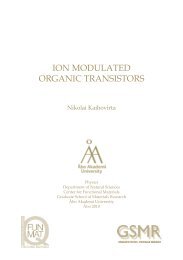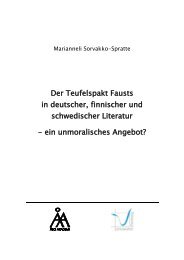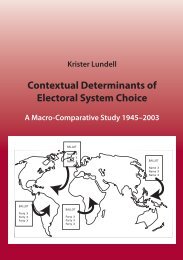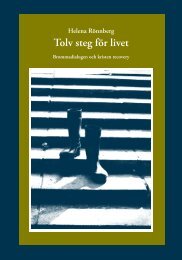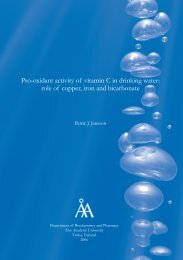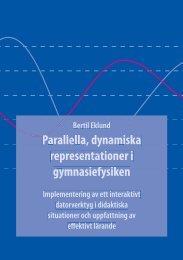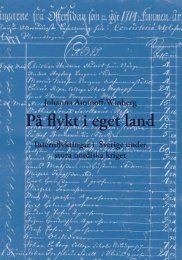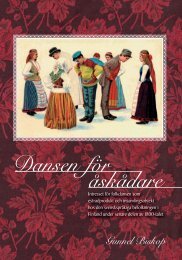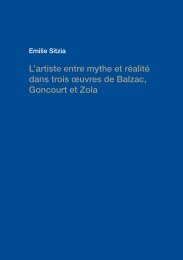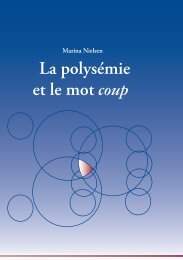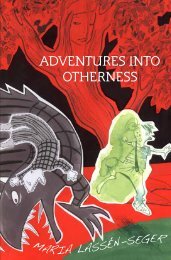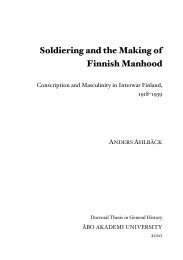Das Universale Recht bei Johannes Calvin - Doria
Das Universale Recht bei Johannes Calvin - Doria
Das Universale Recht bei Johannes Calvin - Doria
Sie wollen auch ein ePaper? Erhöhen Sie die Reichweite Ihrer Titel.
YUMPU macht aus Druck-PDFs automatisch weboptimierte ePaper, die Google liebt.
1344.5. Zusammenfassung der ErkenntnisDer Mensch ist nach <strong>Calvin</strong> also mit seinen angeborenen Gaben undFähigkeiten auch ohne besondere Offenbarung Gottes in der HeiligenSchrift fähig, große Teile des Moralgesetzes zu erkennen. <strong>Das</strong> imMenschen wirkende Gesetz nennt er natürliches Gesetz. Er bestreitet dieBehauptung, dass das natürliche Gesetz den Menschen zum geistlichenLeben führen könnte, aber er gesteht, dass es darauf wirkt, wie dieMenschen miteinander und in menschlichen Gesellschaften leben, dennder Mensch bekommt aus ihm Regeln für sein Leben und Grenzen dafür,was gut und was böse ist, was richtig und was falsch ist, was ehrbar undwas schändlich ist. Es führt den Menschen auch dazu, Taten derNächstenliebe zu tun — seinen Nächsten zu lieben.Gesetz eine ganz andere Rolle als das natürliche Gesetz, das in der gefallenen Natur nur einschwacher Schein des Gesetzes ist. Somit würde das natürliche Gesetz außerhalb desDekalogs stehen und den ewigen und unveränderlichen Willen Gottes schlechter zeigen alsder Dekalog. Kim 2002, 61: “<strong>Calvin</strong> states three areas of its application: moral law: thisespecially stressed in the Ten Commandements and is similar in nature to the natural lawwhich is given even to the pagan. ceremonial law... judicial law: this was given for thepolitical leading of the Jewish people.”64: “<strong>Calvin</strong> emphasizes the fact that God gave to manhis law and put in him His good will. In order that we may know this good will he gave usnatural law and provided us with a conscience as a guardian. However, because of our sinthis conscience has become dulled and so cannot correctly discern right and wrong simplywith natural law. This is why he gave us the written law. This written law of the covenant isbased on the love and faithfulness of God.” Helm 2004, 373 “Yet this is perhaps toopessimistic an estimate of <strong>Calvin</strong>'s view of our natural knowledge of natural law. In hisCommentary on Romans 2: 14, 15 he says (V. 15) that there is not in men a full knowledge ofthe law, only some seeds of what is right implanted in their nature, some notions of justiceand rectitude. Yet these seeds grew and blossomed. All nations ‘of themselves and withouta monitor, are disposed to make laws for themselves’, ‘laws to punish adultery, and theft andmurder, they commended good faith in bargains and contracts'. So while the seed of religionthat remains in fallen human nature has a moral dimension this seed does not remaindormant but expresses itself in laws which fairly closely shadow the laws of the Decalogue.”



